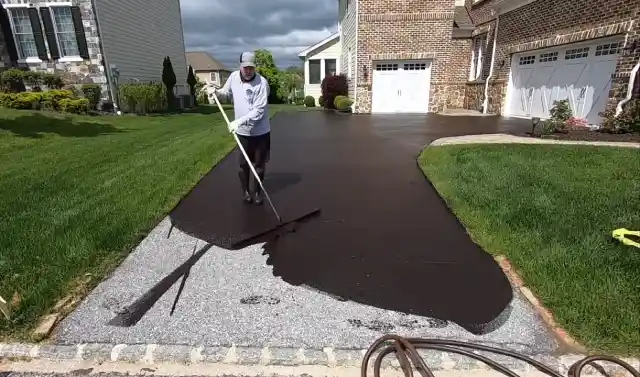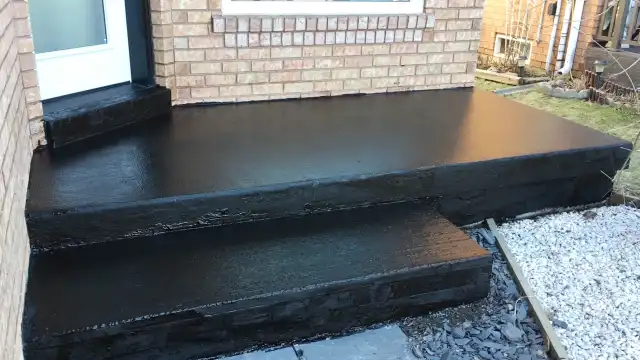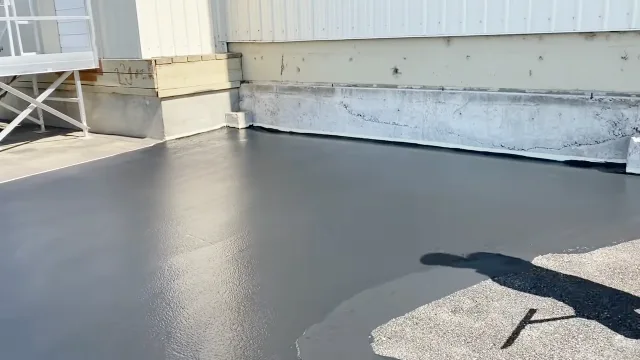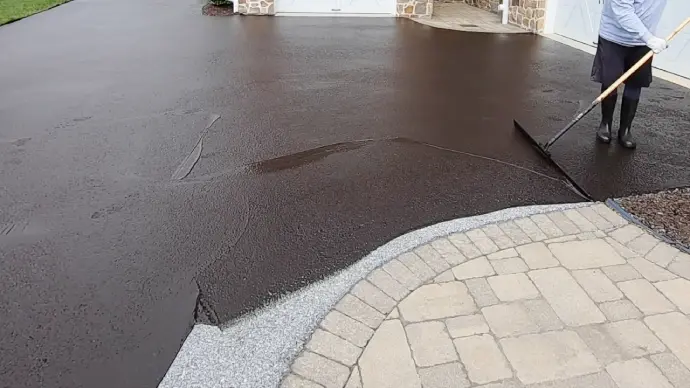Asphalt sealer has been known to provide protection against various environmental factors that can damage asphalt. So, many property owners and contractors have been curious about using asphalt sealer on concrete surfaces. However, it is important to note that asphalt sealer is not designed for concrete surfaces.
Although both materials may seem similar in terms of their composition and texture, they have different properties that require different applications. Applying asphalt sealer on concrete can result in improper adhesion and poor results, rendering the sealer useless.
Discover the repercussions of using asphalt sealer on concrete surfaces and learn why it is not advisable for concrete. Continue reading for valuable insights.
What Happens When You Use Asphalt Sealer on Concrete?

Asphalt sealer is specifically designed to protect asphalt from the wear and tear of weather, water, chemicals, gasoline, oil and other elements. Using asphalt sealer on concrete can cause problems due to the differences in material makeup.
Here are some of the issues that can arise:
#One: Damage to Concrete
Concrete is a highly durable material that is commonly used in construction. However, it can also be subjected to various types of damage over time, such as cracking and spalling caused by weathering or heavy traffic.
Unfortunately, using asphalt sealer on concrete can exacerbate these problems. Asphalt sealer is designed for use on asphalt surfaces and contains different materials than those found in concrete sealers.
When applied to concrete, the chemicals in the asphalt sealer can react with the substrate, causing it to break down more quickly.
This reaction may manifest in cracks or fissures, allowing water to penetrate the concrete slab deeper. Furthermore, if you apply an unsuitable coating like asphalt sealer, the surface could become slippery when wet, posing a safety risk, especially after rain.
#Two: Unsatisfactory Results
Applying asphalt sealer over a concrete surface will often result in an uneven finish due to its different chemical composition compared to traditional concrete sealers. This means that the coating may look patchy or discolored, which is unappealing and suggests low-quality workmanship.
Using asphalt sealer can cause additional problems because it doesn’t adequately protect against UV rays or other environmental factors like acid rain. Thus, homeowners who choose this type of coating may have to reapply it more frequently than they would with higher-quality alternatives.
#Three: Adhesion Issue
Adhesion is the ability of two surfaces to stick together, which is crucial for any coating or sealing application. When applying sealers on concrete, specific products are made specifically for that purpose.
The different chemical formulations in concrete sealers allow them to bond directly to the material’s surface and protect it from water damage, UV rays, and other environmental factors. Using an inappropriate sealer like asphalt on concrete will lead to issues such as cracking, peeling, and flaking due to inadequate bonding.
#Four: Compression Strength
In addition to poor adhesion, using asphalt sealer on concrete can also decrease compression strength. Compression strength is the ability of a material to withstand pressure without breaking or cracking.
Despite concrete’s excellent compression strength, it can weaken and crack when coated with an inappropriate sealer like asphalt.
Asphalt sealers are not designed for use on concrete due to their chemical makeup, which does not allow them to bond correctly with the surface. This lack of bonding can lead to cracks and other forms of damage that compromise the overall structure’s integrity.
#Five: Effect on Surface Texture
Another issue with using asphalt sealer on concrete is the effect it has on the surface texture. Concrete surfaces have a unique texture that provides excellent traction and slip resistance, making them suitable for use in various applications such as driveways, walkways, and parking lots.
Unfortunately, asphalt sealers can alter the texture of the concrete surface and make it more slippery when wet. As a result, these surfaces may become hazardous if subject to rain or other forms of moisture.
What’s the Importance of Choosing the Right Concrete Sealer?

Choosing the right sealer for your concrete surfaces is critical, as not all sealers provide equal protection. Although asphalt sealers may seem logical, they are unsuitable for concrete due to their chemical composition and inability to bond properly with the surface.
Choose the right sealer for concrete for these reasons:
1. Durability is an important factor to consider when selecting an asphalt sealer for a concrete surface.
2. The coverage of the sealer should be checked to ensure that the entire surface is sealed correctly.
3. Proper surface preparation is necessary for the sealer to bond with the concrete and create a protective layer.
4. Different sealers offer different levels of protection and should be chosen based on the desired longevity of the sealer.
5. Applying the sealer without proper surface preparation can result in a weak seal that does not last.
6. Selecting the right sealer for a concrete surface can help ensure that it is properly protected for years to come.
When should sealer be applied to concrete?
Sealer should be applied to concrete only after it has cured completely, which typically takes at least 30 days. It is crucial to ensure that the concrete surface is clean and dry before applying the sealer, and any forecast of rain should be avoided for at least a week if the work is taking place outside.
Applying sealer too early can result in a subpar finish and weak protection, which can lead to various issues down the line. Therefore, following the standard curing time and ensuring a clean and dry surface before applying any sealer to achieve optimal results is recommended.
Is it necessary to wash concrete before sealing it?
Before sealing concrete, it is essential to wash it. Cleaning the concrete surface effectively is crucial to ensure maximum adhesion and longevity of the sealing product. If you don’t clean the concrete properly, dirt, debris, and other contaminants can ruin the sealer and cause it to fail prematurely.
Power washing and using an industrial-strength concrete cleaner are recommended for cleaning the surface and preparing it for sealing. These steps will eliminate any contaminants, allowing the sealer to penetrate deep into the concrete and provide lasting protection against weathering, stains, and other environmental factors.
Therefore, cleaning the concrete thoroughly before applying any sealant for optimum results is highly advisable.
How long does it take for asphalt sealer to dry on the surface?

Asphalt seal coat drying times can vary based on several factors, with temperature being one of the most important ones. On average, it takes roughly 24-48 hours for the sealer to completely dry and cure on the surface.
However, it’s important to note that the day’s specific conditions can also impact drying time. For example, high humidity can prolong the drying process, while direct sunlight and warm temperatures can speed it up.
Sealing concrete surfaces with asphalt sealers is not recommended. However, if you wish to use it, be aware of the proper timeframes. Wait until the sealer has fully dried before walking or exposing it to water to avoid unwanted imprints or peeling.
How many coats of asphalt sealer are typically needed?
Based on industry recommendations, applying two coats of asphalt sealer for optimal protection and longevity of your driveway is advisable. It is important to note that a minimum of eight hours of drying time is necessary between coats.
Give your driveway the ultimate protection it deserves with asphalt sealer. Its dual coating shields your driveway against destructive factors such as UV rays and moisture. While the application process may require substantial effort, it’s best to tackle it over a weekend for the best results.
By adhering to these industry standards, you can prolong the life of your driveway concrete and maintain its overall appearance.
Concrete Surfaces: Using the Right Sealer is Essential
As an expert in the field of asphalt sealing, it is important to educate customers on the risks of using the wrong sealer on their concrete surfaces. Many believe that sealers are interchangeable, but this is simply not true.
Applying asphalt sealer on concrete can cause serious damage, including unsightly peeling, cracking, and flaking. Choosing a product specifically designed for your surface type is always best to avoid these long-term issues.
By selecting the correct sealer for your needs, you can ensure that your surface remains protected and looks its best for years. Think of it like wearing shoes that don’t fit properly – discomfort and problems will follow.
